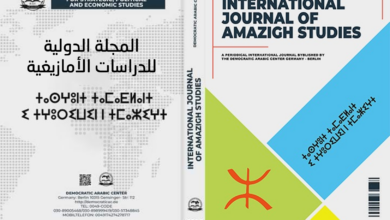دور الحوكمة في إدارة المخاطر المصرفية دراسة مقارنة بين البنوك التقليدية والإسلامية في اليمن
The role of governance in banking risk management A comparative study between traditional and Islamic banks in Yemen

تأليف : خالد قاسم عبده أحمد
نسخة “pdf”-
دور الحوكمة في إدارة المخاطر المصرفية دراسة مقارنة بين البنوك التقليدية والإسلامية في اليمن
الطبعة الأولى “2024″ –من كتاب: :-
دور الحوكمة في إدارة المخاطر المصرفية دراسة مقارنة بين البنوك التقليدية والإسلامية في اليمن
جميع حقوق الطبع محفوظة #المركز_الديمقراطي_العربي ولا يسمح بإعادة إصدار هذا الكتاب أو اي جزء منه أو تخزينه في نطاق إستعادة المعلومات أو نقله بأي شكل من الأشكال، دون إذن مسبق خطي من الناشر .
تقديم :-
هدفت الدراسة إلى معرفة دور الحوكمة في إدارة المخاطر المصرفية في البنوك الإسلامية والتقليدية اليمنية، وكذا التعرف على مستوى تطبيق ادارة المخاطر في البنوك اليمنية عينة الدراسة، وتمثل مجتمع الدراسة بمديري العموم والإدارات ورؤساء الاقسام في البنوك اليمنية، وبلغ مجتمع الدراسة (976) مفردة، كما تم اختيار عينة الدراسة باستخدام أسلوب العينة العشوائية البسيطة، والتي بلغت (276) مفردة.
وتم استخدام المنهج الوصفي التحليلي، في بناء استبانة، كما تم استخدام مجموعة من الأساليب الإحصائية لتحليل النتائج واختبار الفرضيات عبر حزمة البرامج الإحصائية الاجتماعية (SPSS).
وتوصلت الدراسة الى عدد من النتائج أهمها: ان هناك دوراً للحوكمة في إدارة المخاطر المصرفية في البنوك اليمنية عينة الدراسة ، وتحقق هذا الدور من خلال نتائج الدراسة التي أظهرت وجود علاقة إيجابية متوسطة بين مبادئ الحوكمة وإدارة المخاطر المصرفية في البنوك الإسلامية والتقليدية اليمنية، وتبين وجود أثر ذي دلالة إحصائية عند مستوى معنوية (0.05) لمبادئ الحوكمة في اداره المخاطر المصرفية في البنوك الاسلامية والتقليدية اليمنية، ودرجة تحقق متوسطة في قدرة البنوك الإسلامية والتقليدية بأمانة العاصمة على إدارة المخاطر المصرفية بمختلف مصادرها وأنواعها، كما أظهرت نتائج الدراسة وجود مستوى متوسط في إدارة مخاطر التشغيل عبر قيام البنوك بدراسة مخاطر الخسارة المالية المحتملة الناشئة عن عدم كفاية أو فشل طرق العمل، وحرص الإدارات على تفعيل دورها الرقابي.
خلصت الدراسة إلى عدد من التوصيات أهمها:
ضرورة إعطاء اهتمام أكثر والتزام من طرف القيادة العليا في البنوك الاسلامية والتقليدية (قيد الدراسة) لتطبيق الحوكمة بجميع مبادئها لما لها من أهمية ودور في إدارة المخاطر المصرفية، وكذلك إقامة ورشات عمل ودورات تزيد من وعي الموظفين ومديري الإدارات بأهمية الحوكمة ودورها في إدارة المخاطر المصرفية وتعزيز إدارة البنوك الإسلامية والتقليدية لمبدأ الشفافية كتوفير وإبراز الأدلة واللوائح الشفافة الواضحة وإتاحتها لكافة الموظفين.
Abstract
The study aimed to know the role of governance in banking risk management in Yemeni Islamic and conventional banks, as well as to identify the level of application of risk management in Yemeni banks, the study sample.
The study population was represented by general managers, departments, and department heads in Yemeni banks, and the study population reached (976) individuals. The study sample was selected using the simple random sampling method, and consisted of (276) individuals. The descriptive analytical approach was used to build a questionnaire, and a set of statistical methods were used to analyze the results and test hypotheses via the Social Statistical Software Package (SPSS).
The study reached a number of results, the most important of which are: There is a role for governance in banking risk management in the Yemeni banks sample of the study, and this role was achieved through the results of the study, which showed the presence of a moderate positive relationship between the principles of governance and banking risk management in Yemeni Islamic and conventional banks, and it was shown that there is an impact It is statistically significant at a significance level (0.05) for the principles of governance in banking risk management in Yemeni Islamic and conventional banks, and a moderate degree of verification in the ability of Islamic and conventional banks in the capital secretariat to manage banking risks of various sources and types. The results of the study also showed the presence of a medium level in operational risk management.
Through banks studying the risks of potential financial loss arising from inadequacy or failure of business methods, and the departments’ keenness to activate their supervisory role.
The study concluded with a number of recommendations, the most important of which are
the need to give more attention and commitment from the senior leadership in Islamic and conventional banks (under study) to apply governance in all its principles due to its importance and role in managing banking risks, as well as holding workshops and courses that increase the awareness of employees and department managers. The importance of governance and its role in managing banking risks.
The management of Islamic and conventional banks strengthens the principle of transparency, such as providing and highlighting clear, transparent evidence and regulations and making them available to all employees.
الناشر: المركـز الديمقراطي العربي للدراسات الاستراتيجية والسياسية والاقتصادية – ألمانيا – برلين
Democratic Arabic Center- Berlin – Germany



